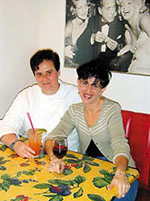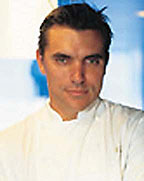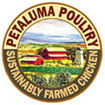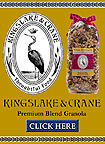
By
Grace Ann Walden
Grace
Ann Asks Great Chefs
What They Think of Restaurant Reviewers
Our
question this month should give the public and those working
in the hospitality industry something to talk about. There is
nothing more controversial than restaurant reviews. The public
suspects reviewers are recognized on the take or have no taste.
Chefs shiver in their clogs when they know an influential reviewer
is in the house.
There is no other industry, other than aspects of the entertainment
industry that is regularly and publicly reviewed, rated and
or flogged. And even a Broadway show has tryouts in the boonies
before opening night. Not so with restaurants, although some
principled reviewers do give new restaurants a few weeks to
get their act together.
Since reviewers, some of whom couldn’t boil an egg, regularly
give restaurateurs advice on how to run their businesses, we
thought we’d ask chefs all over the world, to impart some
advice to restaurant reviewers.
THere
are their Answers.
Matthew Gordon is the chef of Haute
Cabriere Cellar Restaurant, Franschhoek,
in South Africa. The award-winning Haute Cabriere Cellar Restaurant
overlooks one of the most beautiful valleys in the world. The
restaurant’s wines come from the Pinot Noir vineyard on
the slopes immediately below, and its unusual menu has been
designed by Gordon to complement the vineyard’s acclaimed
Pierre Jourdan and Haute Cabrière wines.
Here’s what he had to say:
“I think it is important to know that in a lot of cases
a food critic is dealing with someone’s livelihood, as
chefs often own their own restaurants.
Mistakes do happen in the best of businesses, but millions can
read a damning article. If you have a bad meal in someone’s
restaurant, I think it is important to give it a second look
before slagging it off.”
|
Kerry
Heffernan, with her partner Wendy Levy,
who have 35 combined years experience in the restaurant
business, own Autumn Moon Café
in Oakland, California. Heffernan has cheffed in some
of the top restaurants in the Bay Area, including heading
up the kitchen in the Palace Hotel in San Francisco.
Here’s
Heffernan’s Views:
“Well, I don’t know a lot about writing or
criticism, but I know what I like. I like it when a food
critic is also a good writer. I’d like to see reviewers
speak about why they may have been disappointed in a meal
from a basics perspective. In other words, was the dish
executed the way it was described, was hot food served
hot, seasoned, and balanced from first bite to the last?
I’d like to see a more analytical approach. Many
times I’ve been to a restaurant where I personally
didn’t enjoy the food but I could appreciate the
skill, imagination and hard work that went into the execution
of the dish.”
|
|
Todd
English currently has over a dozen restaurants
spread between New England and Las Vegas. His Olives restaurant,
which he opened in 1989, has been a consistent favorite
in Boston. English is often seen on television, and is
working on a new program called “Todd Cooks.”
He is the author of The Olives Table, The Figs
Table, and The Olives Dessert Table. Here is what
he had to say:
“The first thing to remember is that reviews are
subjective. I have had good and bad reviews sometimes
for the same restaurant, so you need to take it with a
grain of salt. Sometimes the critics really annoy me,
when they don’t understand the food and don’t
do their research to learn about it. After all, it’s
their job to educate themselves on a cuisine or ingredient.
I tell my staff and myself that we don’t do what
we do to please the critics. I got into this business
because I love to cook and that will never change. It’s
still the juice I live on.”
|
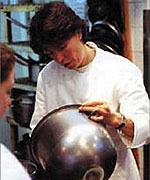 |
Sally
Clarke owns Clarke’s Restaurant,
a food shop by the same name and Clarke’s Bakery
(wholesale) all in London. Sally Clarke has been actively
involved in cooking since her early teens. After attending
school in Guildford, followed by a diploma in hotel &
catering at Croydon Technical College, she studied at
the Cordon Bleu School in Paris.
This
is her advice for Restaurant Critics:
“Please arrive at the restaurant in good heart and
in a good mood with your partner/guest. As all criticism
is “objective,” it is important that the reviewer
views everything in the fairest light. It may be awful
food, ghastly décor and appalling service, but
at least the review would be written in good faith rather
than with an axe to grind. |
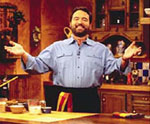

|
The Sicilian-born Nick Stellino, has
published “Nick Stellino’s Family
Kitchen, the companion to his PBS series which
he is about to start filming. It will air in 2003. He
first came to prominence with his PBS cooking show, “Cucina
Amore” one of the most popular of all PBS
cooking shows.
Stellino
echoes Sally Clarke: “Critics need to relax, have
a glass of wine...and also take into consideration what
would the neighbors say about this restaurant - how does
it fit into the community. I think they should write reviews
so that people can understand what they are saying. Sometimes,
I think they’re just trying to show how clever they
are.”
|
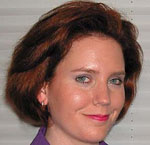

|
Elizabeth
Dougherty, has been on both sides. Currently, she
is a freelance food writer for the Tampa Tribune in Florida,
but in the past she did catering.
“Although I enjoyed catering and a year of formal
culinary classes, my true love has always been the written
word. While transitioning into feature writing, I read every
food feature possible. Culinary happenings, history and,
of course, restaurant reviews became the staples of my literary
diet.
Today’s food critics seem to show an increased sense
of the power they wield. Sometimes what they write means
the difference between profit and loss or even between a
business living or dying. I often ponder the reason for
writing a negative review. Would busy people rather take
the time to read about where TO eat rather than where NOT
to waste their time? I tend to think so.” |
And finally, restaurateur Sam Arnold, who also
has been on both sides of the fence.
In his long career, he’s been both a magazine and newspaper
restaurant critic (both Denver Post and Rocky Mountain News),
a radio food show host and TV show host. On the other side of
the coin, he operated his restaurant The Fort
since 1963 with a 13-year time out when he thought he’d
sold it.
Here is his manifesto or should we say observations:
“Be anonymous.
Don’t review total disasters. They will die soon enough
without your help.
If the bread and butter or oil are wonderful, chances are the
meal will also be good.
Check the appearance of the rest rooms. Watch the handling of
silverware by waitstaff.
Notice smiles and eye contact (or lack thereof) of host/hostess
greeter, server and bussers.
Have sufficient food prep knowledge to know what THEY’RE
doing. Can you identify herbs and spices? What is the chef attempting
to do? Was he/she successful?
Try eating either very early or very late to see if staff is
able to be up to speed before or after the rush. First customers
are often the most poorly served.
Give the operator some hope. It’s hard enough being in
business without being flogged.
Be dead accurate on prices and items of importance. One magazine
reviewer, who obviously had never been to my restaurant, stated
that The Fort was an hour’s drive from town. It is 22
minutes from the heart of downtown in 5 o’clock traffic.
I’m sure that that comment cost us thousands of dollars.”
Comments
were edited for space considerations.
|




